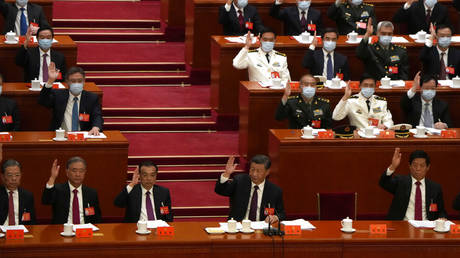
US thinkers seem to be certain that the Communist Party is doomed to fail because of ‘bad emperor’ Xi Jinping
Over 20 years ago, author Gordon Chang published a book titled ‘The Coming Collapse of China’ – a text which predicted the demise of the country’s ruling Communist Party via an eventual financial implosion by 2011. Two decades on, Chang has devolved into a right-wing commentator launching inflammatory attacks on Beijing on mainstream American media outlets from Fox to NBC.
Because of this, it is not surprising that Chang is rarely seen alongside more serious China watchers and analysts. Yet, arguably the sentiment, or frame of mind, which he espouses in the book, very much lives on. Recently, an article was penned in Foreign Affairs by Jonathan Tepperman, someone who is respectable and uncontroversial, titled: ‘China’s Dangerous Decline’.
In this article, Tepperman follows a school of thought espoused by a group of thinkers who argue that the so-called ‘rise of China’, a discourse thickly embedded throughout the mainstream media and politics, as well as in Beijing itself, is in fact over. Such a rise, which was characterized by rapid economic growth over the past 40 years or so, is said to have been ended by the policies brought about by Xi Jinping, who Tepperman describes as a “bad emperor.”
He argues China’s economic growth has been jettisoned by Covid-19 policies, crackdowns on the technology sector, a looming debt crisis, and future demographic problems. In presenting this thesis, he describes China’s future as that of a “supersized North Korea” and believes because of this, it will become more dangerous, so he warns against American Cold War triumphalism. The argument does not attempt to predict the end of Communist China as Gordon Chang did, but in many ways, it embodies the same set of assumptions which form a broader discourse in the West. That is, ‘China is doomed to fail’ in one way or another.
For Tepperman, Xi doomed China by purposefully taking the country off the route of further Westernization and liberalization and towards a more centralized leadership which reinvigorated the authority of the party and ideology in China’s governance. This is also a running theme in Western commentary and a significant factor as to why Western policies towards Beijing changed. This is because the ‘end of history’ thesis as espoused by Francis Fukuyama, perhaps infamously now, built on the very American post-Cold War triumphalism which Tepperman discusses, truly believed China’s transition to liberal democracy was only a matter of time.
It was on this ideological confidence, the conviction of the final victory of liberalism, that China’s growth was tolerated for so many decades and efforts were not made to contain it earlier. However, as China grew, the long-awaited liberalization did not materialize, and instead, Xi committed an act of blasphemy – to frame China’s political development in ways which the West did not intend for it, and worse still, positioning Beijing as a power to shape the world in ways which were deemed disadvantageous to American hegemony. Thus, as China’s inevitable ‘collapse’ did not come to fruition, the gears shifted towards trying to ‘force’ China to fail through geopolitical confrontation and a new age of great-power competition.
Because of this, a new pattern of thought has emerged in Western commentary – a hope that Xi’s political project – completing the rise of China as a communist power, the bid to reunify Taiwan with the mainland, becoming the world’s largest economy, and completing the Belt and Road Initiative – all end in failure. If the regime does not collapse or reform as was once assumed, hope is vested instead in failure and stagnation. This is because if China were to succeed, it will permanently dent the unchallenged supremacy of the Western model, and this is why in everyday coverage, China is not given credit for anything, and every single development is now presented dramatically as a disaster or governance failure, which always happens to be Xi Jinping’s fault.
So, of course, the question remains, is China really in decline? Throughout the year, a great deal of media coverage has attacked the country for its self-imposed economic setbacks of ‘zero-Covid’ policies, only to then turn around and say that ending the policy was also a disaster. The intuitive bias of such coverage problematically brands everything China does in pessimistic terms, to the point one may be tempted to write China off too early. Worse still, the same criteria of reporting are never applied to Western economies, who have had an equally miserable year economically.
This hasn’t been a glorious year for the US or Europe, who will still attain less growth than China not only this year, but next year, too, despite Biden’s publicly posted misinformation about doing so. As such, there is no definitive reason to believe that China is in decline, and the outlook of its competition with the US is likely to be merited upon Beijing’s ability to innovate and break out of America’s technological blockade.




